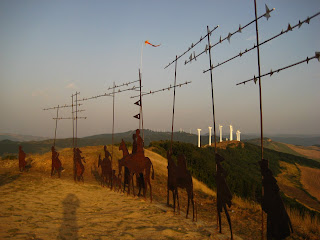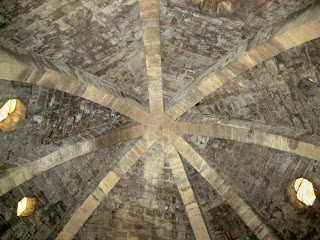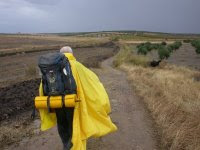Day 4, August 28: Cizur Menor to Cirauqui (26 km; 6:25)
From Cizur Menor it was a long, two-hour, almost-continuous climb to the modern windmills of Alto de Perdon. The top of the ridge was decorated with a cast iron pilgrim silhouette statue.
 Photo 244: The ridge and pilgrim silhouette at Alta de Peron. In the distance you can see white windmills.
Photo 244: The ridge and pilgrim silhouette at Alta de Peron. In the distance you can see white windmills.
The view from the ridge was stunning in both directions. To the west we could see the steep loose rock descent into the more arid wine growing region of La Rioja: to the east we could see Pamplona and the Pyrenees Mountains.
 Photo 243:Pyrenees Mountains to the east.
Photo 243:Pyrenees Mountains to the east.
 Photo 245: The trail and view to the west.
Photo 245: The trail and view to the west.
During the rest of the day we walked past groves of almond and olive trees and fields of asparagus, corn and grape vines.
At Muruzabal we decide to take the alternate (but longer) route to Puente la Reina (Queen’s Bridge), so we could view the stunning church at Eunate attributed to the Knights Templar. Its octagonal shape is typical of the Knights Templar who often built churches in this style. More uniquely it is thought to be the only church in the world where the orientation of the entrance and the altar is on a north-south axis rather than the traditional east-west. No-one knows why. It was worth the few extra kilometres of walking.
 Photo 248: The ceiling of the octagonal church at Eunate.
Photo 248: The ceiling of the octagonal church at Eunate.
 Photo 250: Exterior of the church.
Photo 250: Exterior of the church.
The town of Puente la Reina exists like so many others solely because of the Camino. Initially there was no easy way to cross the river Arga and high prices were charged to ferry peregrinos across it. Ultimately a Spanish queen commissioned the six-arched bridge, hence the name.
 Photo 260: The bridge at Puenta La Reina.
Photo 260: The bridge at Puenta La Reina.
From Puente la Reina we followed the banks of the river Arga, but none of us were prepared for the brutally steep climb from the river valley to Maneru, in temperatures we were later told were in excess of 40 C. The fountain at the entrance to Maneru was a godsend as we had run out of water. I immersed my head under the faucet and I downed a half litre of water in one gulp.
From there it was an easier three kilometres to the beautiful mediaeval village of Cirauqui.
 Photo 262: Cirauqui in the distance.
Photo 262: Cirauqui in the distance.
The private albergue, Maralotx, was the best yet: modern with good facilities and comfortable bunk beds.
 Photo 264: The communal bedroom in one of the more modern albergues.
Photo 264: The communal bedroom in one of the more modern albergues.
 Photo 266: Albergue Maralotx. Note the steep climb to the entrance.
Photo 266: Albergue Maralotx. Note the steep climb to the entrance.
Later in the evening we had a wonderful communal dinner in the restaurant below the albergue.
 Photo 270: Communal dinner.
Photo 270: Communal dinner.
 Photo271: Same dinner, different people.
Photo271: Same dinner, different people.
Great salad, followed by spaghetti and meatballs and all the red wine we could drink. We, of course, took full advantage of the bounty! Afterward we entered the church across from the albergue and were enchanted by the 15-member male choir that was practising. They were fabulous!
Unfortunately we got limited sleep because of the heat and the church bells that rang without fail every 15 minutes throughout the night.
 Photo 265: The offending bells that rang every 15 minutes.
Photo 265: The offending bells that rang every 15 minutes.
Because of the heat we left the windows to the albergue open. An enterprising cat saw this as an invitation during the night and snuck into the room, making off with the ring of extra-spicy chorizo that was to be our lunch the following day. I hope that cat got kaka picante (I’ll leave the translation to the reader).
Janos looks a bit like Simon Cowell.
 Photo 269: "Simon Cowell," aka Janos.
Photo 269: "Simon Cowell," aka Janos.
We were going to start a rumour that Simon was walking the Camino a la Shirley MacLaine. Nah! (MacLaine walked the Camino in the mid-90s and was hounded by the paparazzi. Incidentally, her book, “The Camino, a Journey of the Spirit” isn’t worth reading).
 Photo 244: The ridge and pilgrim silhouette at Alta de Peron. In the distance you can see white windmills.
Photo 244: The ridge and pilgrim silhouette at Alta de Peron. In the distance you can see white windmills.The view from the ridge was stunning in both directions. To the west we could see the steep loose rock descent into the more arid wine growing region of La Rioja: to the east we could see Pamplona and the Pyrenees Mountains.
 Photo 243:Pyrenees Mountains to the east.
Photo 243:Pyrenees Mountains to the east.  Photo 245: The trail and view to the west.
Photo 245: The trail and view to the west. During the rest of the day we walked past groves of almond and olive trees and fields of asparagus, corn and grape vines.
At Muruzabal we decide to take the alternate (but longer) route to Puente la Reina (Queen’s Bridge), so we could view the stunning church at Eunate attributed to the Knights Templar. Its octagonal shape is typical of the Knights Templar who often built churches in this style. More uniquely it is thought to be the only church in the world where the orientation of the entrance and the altar is on a north-south axis rather than the traditional east-west. No-one knows why. It was worth the few extra kilometres of walking.
 Photo 248: The ceiling of the octagonal church at Eunate.
Photo 248: The ceiling of the octagonal church at Eunate. Photo 250: Exterior of the church.
Photo 250: Exterior of the church.The town of Puente la Reina exists like so many others solely because of the Camino. Initially there was no easy way to cross the river Arga and high prices were charged to ferry peregrinos across it. Ultimately a Spanish queen commissioned the six-arched bridge, hence the name.
 Photo 260: The bridge at Puenta La Reina.
Photo 260: The bridge at Puenta La Reina. From Puente la Reina we followed the banks of the river Arga, but none of us were prepared for the brutally steep climb from the river valley to Maneru, in temperatures we were later told were in excess of 40 C. The fountain at the entrance to Maneru was a godsend as we had run out of water. I immersed my head under the faucet and I downed a half litre of water in one gulp.
From there it was an easier three kilometres to the beautiful mediaeval village of Cirauqui.
 Photo 262: Cirauqui in the distance.
Photo 262: Cirauqui in the distance. The private albergue, Maralotx, was the best yet: modern with good facilities and comfortable bunk beds.
 Photo 264: The communal bedroom in one of the more modern albergues.
Photo 264: The communal bedroom in one of the more modern albergues. Photo 266: Albergue Maralotx. Note the steep climb to the entrance.
Photo 266: Albergue Maralotx. Note the steep climb to the entrance. Later in the evening we had a wonderful communal dinner in the restaurant below the albergue.
 Photo 270: Communal dinner.
Photo 270: Communal dinner. Photo271: Same dinner, different people.
Photo271: Same dinner, different people. Great salad, followed by spaghetti and meatballs and all the red wine we could drink. We, of course, took full advantage of the bounty! Afterward we entered the church across from the albergue and were enchanted by the 15-member male choir that was practising. They were fabulous!
Unfortunately we got limited sleep because of the heat and the church bells that rang without fail every 15 minutes throughout the night.
 Photo 265: The offending bells that rang every 15 minutes.
Photo 265: The offending bells that rang every 15 minutes. Because of the heat we left the windows to the albergue open. An enterprising cat saw this as an invitation during the night and snuck into the room, making off with the ring of extra-spicy chorizo that was to be our lunch the following day. I hope that cat got kaka picante (I’ll leave the translation to the reader).
Janos looks a bit like Simon Cowell.
 Photo 269: "Simon Cowell," aka Janos.
Photo 269: "Simon Cowell," aka Janos.We were going to start a rumour that Simon was walking the Camino a la Shirley MacLaine. Nah! (MacLaine walked the Camino in the mid-90s and was hounded by the paparazzi. Incidentally, her book, “The Camino, a Journey of the Spirit” isn’t worth reading).


Comments